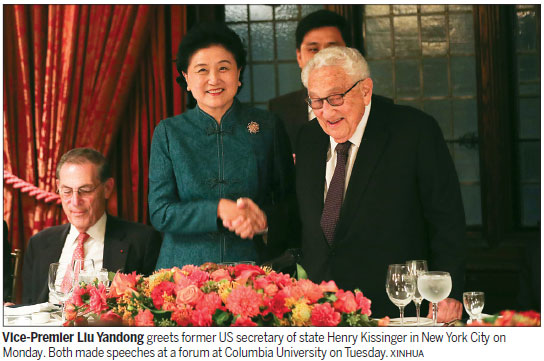Liu: Tap 'positive energy' of China-US relations
By Hong Xiao and Wang Linyan in New York (China Daily USA) Updated: 2017-09-27 10:53The key to the China-US relationship is how the two countries' peoples relate to each other, Vice-Premier Liu Yandong said in New York on Tuesday.
"Only by constantly releasing the positive energy of the people-to-people and cultural exchange between China and the US, enhancing the understanding and friendship between the two peoples and consolidating the friendly public opinion foundation of the two countries, can Sino-US relations maintain a long-term, healthy and stable development," Liu said at the opening ceremony of the US-China University Presidents and Think Tank Forum at Columbia University.
The daylong forum, themed US-China Relations in the Next 50 Years, attracted 200 attendees, including presidents and representatives of universities from the United States and China, senior American politicians and representatives from Columbia University.
People-to-people and cultural exchange, described by President Xi Jinping as the foundation of Sino-US relations, is where the two countries have the least disagreement and the most consensus, Liu said.
She will co-chair the Social and People-to-People Dialogue with US Secretary of State Rex Tillerson in Washington on Thursday. It's one of the four high-level dialogue mechanisms reached by President Xi and US President Donald Trump in April.
In recent years, the scale of exchange continues to expand. The two sides have set up more than 40 institutionalized cooperation platforms and they have promoted professional cooperation in areas including science and technology, health and clean energy.
Liu gave some numbers: Over the past seven years, the number of Chinese students studying in the US has increased dramatically as has the number of Chinese visitors to the US.
The US side has set the goal of having 1 million American students learn Chinese by 2020; the number of US students in China is nearly 24,000, which makes the US the second largest source of international students in China.
"It (such kind of exchanges) enriches the connotation of the Sino-US relations, so the relationship between the two countries is turning warmer, more resilient and vibrant," she said.
According to a survey done by US polling agency Gallup in February, Americans have been feeling more positive toward China in recent years, and now 50 percent say they have a favorable opinion of China - up from 44 percent in 2016 and 41 percent in 2012. That is the highest level in the Gallup poll in nearly 30 years.
To establish exchanges as the foundation of bilateral relations, Liu believes China and the US should take to the grassroots.
She suggested that the two governments provide more conveniences to people of the two countries in tourism, overseas study and exchange visits and create conditions to encourage young people to communicate more.
"Investing in young people is investing in the future," Liu said.
She advised focusing on benefiting people's livelihoods and enhancing their sense of achievement during the bilateral exchanges while promoting understandings.
Liu said that because the university is the cradle of talent and think tanks the incubators of thought, they "not only affect the views of the government and the public on Sino-US relations, but also affect the awareness of next generation on Sino-US relations".
"In this sense, you are those who are shaping Sino-US relations in the next 50 years," Liu told the attendees, with a call to further deepen the cooperation between universities and think tanks in the two countries.
Henry Kissinger, former US secretary of state, said in his speech at the event that the US-China relationship will be the "defining" relationship of the 21st century.
"It will be imperative that we work together to lift our relationship from the pragmatic, and from the day-to-day solving of problems to the conceptual, to the creation of a new encompassing concept of a world order that promotes peace and human progress, as we are now doing on the Korean issue," Kissinger said.
"Today, they must see a concept not of security but of co-evolution in which two great societies can exist side by side, occasionally pursuing different objectives, but merging them in a common protection of the necessities and the opportunities that are the imperative of our age," he said.
"Our challenge is to find a way for American exceptionalism and China's dreams to produce a new world order for the benefit of all."
Jan Berris, vice-president of the National Committee on US-China Relations, said Liu is a role model for women worldwide.
"She is a positive woman; she has a lot of energy and is a wonderful role model for women, not just Chinese women, but women all over the world," Berris said. "And today was no exception. She spoke very thoughtfully. She hit on the two elements that are currently important in terms of strengthening China-US relations: win-win issues and strengthening cooperation through mutual trust and mutual benefit."
Contact the writers at wanglinyan@chinadailyusa.com

- 'Cooperation is complementary'
- Worldwide manhunt nets 50th fugitive
- China-Japan meet seeks cooperation
- Agency ensuring natural gas supply
- Global manhunt sees China catch its 50th fugitive
- Call for 'Red Boat Spirit' a noble goal, official says
- China 'open to world' of foreign talent
- Free trade studies agreed on as Li meets with Canadian PM Trudeau
- Emojis on austerity rules from top anti-graft authority go viral
- Xi: All aboard internet express











